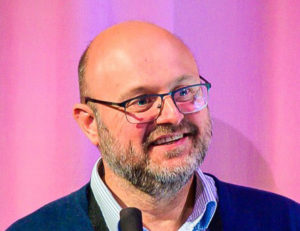A BOOK ABOUT TAKING CONTROL OF OUR DIGITAL LIVES
Digital technologies should be making life easier. And to a large degree they do, transforming everyday tasks of work, consumption, communication, travel and play. But they are also accelerating and fragmenting our lives affecting our well-being and exposing us to extensive data extraction and profiling that helps determine our life chances.
Is it then possible to experience the joy and benefits of computing, but to do so in a way that asserts individual and collective autonomy over our time and data?
Drawing on the ideas of the ‘slow movement’, Slow Computing sets out numerous practical and political means to take back control and counter the more pernicious effects of living digital lives.
ISBN 978-1529211269
Bristol University Press, £14.99
20% discount (£11.99) at: Bristol University Press
35% discount (£9.75) if sign you up to the BUP mailing list
Buy at: Amazon.com, Amazon.co.uk

REVIEWS
PAUL Dourish
UNIVERSITY OF CALIFORNIA, IRVINE
“An important contribution to understanding our technological present and future. It handles complicated matters with a deft touch, without minimizing the scholarly arguments.”
teresa scassa
UNIVERSITY OF OTTAWA
“This perceptive and engaging book provides a clear diagnosis and a thoughtful prescription for taking back control of our digital lives.”
DAVID BEER
UNIVERSITY OF YORK
“Responding to the pace of our dizzying tech-dominated lifestyles, this stunningly crafted book helps the reader to think, reflect and keep their balance.”
HARTMUT ROSA
FRIEDRICH SCHILLER UNIVERSITY, JENA
“No one knows yet where the digital acceleration of our lives will lead – this is a most powerful and illuminating plea for us citizens to take back control!”
Liesbet van Zoonen
ERASMUS UNIVERSITY ROTTERDAM
“Two world-class digital scholars explain brilliantly why and how we, as individuals and as society, need to slow down our digital pace.”
MARK GRAHAM
OXFORD UNIVERSITY
“We urgently need strategies for reclaiming control over our digital lives. Slow Computing offers exactly that. A powerful manifesto for a kinder, calmer, and fairer digital future.”
DEBORAH LUPTON
UNSW, SYDNEY
“Convincingly demonstrates how finding the ‘right speed’ can enhance the pleasure of using digital technologies and bring agency and balance back into people’s lives”
JAMES ASH
NEWCASTLE UNIVERSITY
“Offers a rallying call for digital balance and practical steps to becoming more politically aware in the use of digital devices. A remarkable and timely read.”
Jim thatcher
UNIVERSITY OF WASHINGTON, TACOMA
“Fraser and Kitchin’s work at the intersection of digital technologies and society continues to reshape the ways we think through and engage with these powerful devices.”
martin dodge
UNIVERSITY OF MANCHESTER
“It is increasingly clear that computers are compressing our lives in damaging ways, but we cannot live without them, so we must find a route to a more moderated way of digital. The wide ranging analysis in Slow Computing provides the best available route maps.”
Leighton evans
SWANSEA UNIVERSITY
“A timely, critical and vital manifesto on how we can break free of the trance-like state our digital devices and platforms hold us in and take back control of computing.”
shannon mattern
NEW SCHOOL, NY
“While new processors and networking protocols promise ever-faster computational power, Kitchin and Fraser prompt us to ask whether speed is an inherent good. Computing slowly can offer both individual and collective means of countering over-extension, exhaustion, exploitation, acceleration, extraction, and injustice.”
PODCAST
In this two-part podcast for the Transforming Society blog we outline the key ideas of the book. In part 1, we discuss the consequences of digital technologies, focusing on time acceleration and data extraction. In part 2, we look at practical ways in which we can create more balanced digital lives, both individually and collectively.
ALISTAIR FRASER
Alistair Fraser is a lecturer in the Department of Geography at Maynooth University, Ireland. His research focuses on the interaction of agrarian change and the food economy, based on research fieldwork in South Africa, Uganda, and Mexico. He is now conducting research on the way digital technologies, such as precision agriculture and curated social media, alter the geographies of food. He is the author of Global Foodscapes: Oppression and Resistance in the Life of Food (Routledge, 2016) and numerous articles in academic journals, and is an editor of the journal Human Geography.
https://www.maynoothuniversity.ie/people/alistair-fraser
ROB KITCHIN
Rob Kitchin is a professor in the Maynooth University Social Sciences Institute, Ireland. He wrote his first article about the internet in 1995 and has conducted extensive research on digital technologies and their impact on society. He is (co)author or (co) editor of 30 non-fiction books including, Mapping Cyberspace (Routledge, 2000), Code/Space: Software and Everyday Life (MIT Press, 2011), The Data Revolution (Sage, 2014), Understanding Spatial Media (Sage, 2017), Digital Geographies (Sage, 2018), The Right to the Smart City (Emerald, 2019), and How to Run a City Like Amazon, and Other Fables (Meatspace Press, 2019). He has been an editor of three leading geography journals and editor-in-chief of the 12-volume International Encyclopedia of Human Geography (Elsevier, 2009). He is a recipient of the Royal Irish Academy’s Gold Medal for the Social Sciences.
BUY THE BOOK
Released Sept 2020
ISBN 978-1529211269
Bristol University Press
£14.99
20% discount (£11.99) at: Bristol University Press
35% discount (£9.75) if sign you up to the BUP mailing list
Buy at: Amazon.com, Amazon.co.uk
AVAILABLE IN ALL GOOD BOOK STORES
Site created by Rob Kitchin, March 2020




